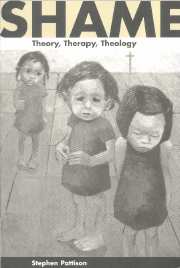Book contents
- Frontmatter
- Contents
- Preface
- Introduction
- PART I APPROACHING SHAME
- PART II ENCOUNTERING SHAME
- Overview of Part II
- 3 The ecology of shame
- 4 Chronic shame
- 5 Some effects and implications of chronic shame
- 6 Aspects of the socio-historical significance of shame
- 7 Dealing with shame: the task of integration
- Summary: towards a working understanding of shame
- PART III SHAME AND CHRISTIANITY
- Epilogue
- Bibliography
- Index
4 - Chronic shame
Published online by Cambridge University Press: 05 June 2012
- Frontmatter
- Contents
- Preface
- Introduction
- PART I APPROACHING SHAME
- PART II ENCOUNTERING SHAME
- Overview of Part II
- 3 The ecology of shame
- 4 Chronic shame
- 5 Some effects and implications of chronic shame
- 6 Aspects of the socio-historical significance of shame
- 7 Dealing with shame: the task of integration
- Summary: towards a working understanding of shame
- PART III SHAME AND CHRISTIANITY
- Epilogue
- Bibliography
- Index
Summary
[S]hame as a healthy emotion can be transformed into shame as a state of being. As a state of being, shame takes over one's whole identity. To have shame as an identity is to believe that one's being is flawed, that one is defective as a human being. Once shame is transformed into an identity, it becomes toxic and dehumanizing.
(Bradshaw 1988: vii)Many people experience what is described as shame acutely, reactively, and only for a short space of time. For some, however, shame is a permanent trait or sentiment rather than a temporary state (Tantam 1998: 168). It becomes a dominant characteristic, a deeply engrained habitual mode of reacting to self and others. Such people may be described as shame-bound, shame-ridden, shame-prone, or toxically or chronically shamed. They live permanently diminished, distrustful, unhappy and uncomfortable lives: ‘Any human emotion can become internalized. When internalized an emotion stops functioning in the manner of an emotion and becomes a characterological style … The person doesn't have anger or melancholy, she is angry and melancholy’ (Bradshaw 1988: 10–11).
Here are a couple of examples from my own recent experience of what it means to have a personality shaped by a pervasive sense of shame and being ashamed.
A few years ago, I was sitting in a station buffet when a friend of mine whom I had not seen for about ten years walked in. I recognised him immediately but he did not see or recognise me.
- Type
- Chapter
- Information
- ShameTheory, Therapy, Theology, pp. 93 - 109Publisher: Cambridge University PressPrint publication year: 2000



